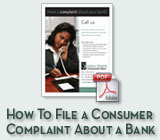
"What happened to..."
my financial institution's regulator?
On July 21, 2011, several regulator changes occurred. The Consumer Financial Protection Bureau (the Bureau) opened its doors and became the consumer compliance regulator for the nation's largest banks, thrifts and credit unions. It will handle certain consumer complaints against those institutions.
The Office of Thrift Supervision (OTS), which regulated savings and loan associations and savings banks, is no longer in operation. For compliance with consumer protection laws, large savings associations are now supervised by the Bureau, while small entities are regulated by the Office of the Comptroller of the Currency (OCC) or the Federal Deposit Insurance Corporation (FDIC), depending on whether the savings association has a national or a state charter.
We can help you determine which regulator will handle your complaint. If you have questions or need assistance with filing a complaint, please contact us.
my bank account?
If you stop making deposits or withdrawals from your account for a long period of time, a bank may treat your account as "dormant" and it may assess fees for not using your account. After a time, the bank will take any funds out of your account and send it to state officials to hold until the owner claims it. Each state has a department of "unclaimed property." Common types of unclaimed property include:
- Bank accounts and safe deposit box contents
- Stocks, mutual funds, bonds, and dividends
- Uncashed checks and wages
- Insurance policies, certificates of deposit, trust funds
- Utility deposits, escrow accounts
Here's how you can find out if you have any money from an old account. First, if possible, contact the bank where you opened the lost account. If the bank no longer exists, you can search the National Information Center or the FDIC's Bank Find website to find out if the bank was bought by another institution.
If the bank still exists but does not have your account, check with your state's unclaimed property department through the National Association of Unclaimed Property Administrators.
my bank?
You may search the FFIEC Consumer Help Center. The National Information Center will also help you determine whether a bank still exists or merged with another institution, its history, and the addresses of the bank's offices and branches. Another resource is the FDIC's Bank Find.
my complaint?
When you file a complaint with Federal Reserve Consumer Help, our first action is to determine which Reserve Bank or banking agency has responsibility for investigating your complaint. We then forward your complaint to that regulator and notify you about where the complaint was sent and how to contact that agency. Sometimes we need additional information about your complaint before it can be processed; in those cases, we will send you a letter or contact you by telephone to ask for the needed information. In either case, you should hear from us within 15 business days. If you have been waiting more than 15 business days, please contact us.
the money in my account after I made a purchase?
Retailers, often gas stations, may put a hold on some of the funds in your account to cover purchases you make with a debit or credit card. This is known as debit or credit card "blocking." Retailers may do this to make sure that you have enough money in your account to cover the purchase or that you do not go over your credit limit. Sometimes the block or hold on your account is for more than the amount of your purchase. Also, the hold can last for a day or two, until the transaction is fully processed. Generally, there is no federal law limiting the amount of the hold or block, so when comparing credit and debit card offers, shop around. You may want to consider doing business with card companies that use shorter blocks. For more information, see the Federal Trade Commission (FTC) FACTS for Consumers: Credit and Debit Card Blocking pamphlet.








